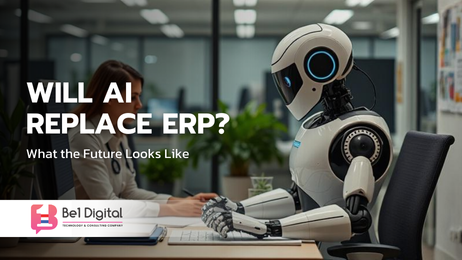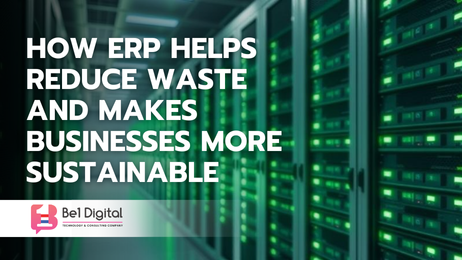
The Future of ERP: How AI, Automation, and Cloud Computing Are Reshaping Business Operations
In recent years, Enterprise Resource Planning (ERP) systems have evolved far beyond their original function of integrating core business processes. As we look to the future, ERP is being reshaped by cutting-edge technologies such as Artificial Intelligence (AI), automation, and cloud computing. These advancements are not only streamlining operations but also transforming how businesses make decisions, interact with customers, and adapt to changing markets. This article will explore how these emerging technologies are revolutionizing ERP systems and shaping the future of business operations.
1. Artificial Intelligence (AI): Making ERP Smarter
AI is one of the most exciting developments in ERP systems. By integrating AI into ERP, businesses can automate complex tasks, uncover valuable insights from data, and improve decision-making. AI-powered analytics in ERP can predict trends, automate customer interactions, and optimize supply chain processes by anticipating demand or identifying inefficiencies. Additionally, AI can help HR departments manage employee performance, predict turnover rates, and recommend tailored training programs.
AI is turning ERP systems from simple data processors to intelligent business assistants that proactively guide organizations toward more effective strategies.
2. Automation: Streamlining Operations
Automation is a key driver in the transformation of ERP systems. By automating repetitive tasks such as data entry, inventory management, and payroll processing, ERP systems free up valuable time for employees to focus on more strategic activities. Automation also reduces human error, ensuring that business processes are more accurate and efficient.
ERP solutions with built-in automation capabilities can streamline accounting, sales, procurement, and HR functions, resulting in faster decision-making and improved operational efficiency. For example, automatic invoicing and payment processing can drastically reduce the workload for finance departments while speeding up cash flow cycles.
3. Cloud Computing: ERP in the Cloud
Cloud computing is perhaps the most impactful innovation in ERP systems in recent years. Cloud-based ERP systems offer flexibility, scalability, and accessibility that traditional on-premise ERP systems cannot match. With cloud ERP, businesses no longer need to worry about maintaining complex IT infrastructure or expensive hardware. The system can be accessed from anywhere, making it easier for teams to collaborate and work remotely.
Cloud-based ERP solutions are also more cost-effective for businesses, as they operate on a subscription model and can be scaled up or down based on needs. Furthermore, cloud ERP systems often come with automatic updates, ensuring that businesses are always using the latest features without the need for manual upgrades.
4. Advanced Analytics and Reporting: Unlocking Data Insights
The combination of AI and cloud computing allows ERP systems to provide advanced analytics and reporting tools. With more data than ever being collected, businesses need the ability to analyze and interpret this information effectively. ERP systems powered by AI can identify patterns and trends within this data, offering predictive insights that help businesses make proactive decisions.
For example, an AI-driven ERP system might analyze sales data and predict customer demand, allowing a company to optimize its inventory levels. Similarly, ERP systems with analytics tools can help HR managers make informed decisions about hiring, employee retention, and talent management by analyzing workforce data.
5. Integration Across Platforms: A Unified Business Ecosystem
One of the core advantages of ERP is its ability to integrate various business functions into one unified system. As businesses adopt AI, automation, and cloud computing, the integration capabilities of ERP systems are becoming even more powerful. Modern ERP platforms are designed to seamlessly connect with other software solutions, such as Customer Relationship Management (CRM), Marketing Automation, and Supply Chain Management systems.
This integration creates a holistic view of the business, making it easier for executives and managers to align strategies across departments. For example, data from marketing campaigns can be linked directly to sales performance, helping businesses understand which initiatives drive the most revenue.
6. Scalability and Flexibility for Future Growth
As businesses grow, their needs change, and ERP systems must be able to adapt. Cloud-based ERP systems are inherently more scalable, allowing companies to expand their usage without significant additional investment in infrastructure. The flexibility of these systems ensures that businesses can quickly implement new features, add new users, and integrate new processes as their needs evolve.
AI and automation further enhance the scalability of ERP systems by enabling them to handle increasingly complex operations without requiring manual intervention. For instance, a growing business can rely on automated data processing to manage a larger volume of transactions, without overburdening their staff.
7. Improved Customer Experience
AI-powered ERP systems can also improve the customer experience by enhancing the accuracy and efficiency of order fulfillment, inventory management, and customer service. With AI, ERP systems can predict customer preferences and personalize interactions, leading to stronger customer relationships.
Automation can also speed up customer-facing processes, such as order processing and billing, which in turn improves customer satisfaction and loyalty. Cloud-based ERP allows businesses to provide customers with real-time access to product availability and order status, improving transparency and communication.
Conclusion
The future of ERP is bright, driven by the power of AI, automation, and cloud computing. These technologies are enabling ERP systems to become more intelligent, efficient, and scalable, helping businesses stay competitive in a rapidly changing marketplace. By leveraging AI for predictive analytics, automating routine tasks, and moving to the cloud for greater flexibility, businesses can unlock new levels of operational efficiency and drive innovation. As ERP continues to evolve, organizations that embrace these technologies will be better positioned to succeed in the digital age
Need an Experienced Business Consultant?
- K.Boonyasak (Toon)
- 063-660-4119
- boonyasak.s@be1digital.co.th
- K. Supaporn ( Meaw)
- 089-998-3004
- supaporn.be1group@gmail.com
Recent Posts






